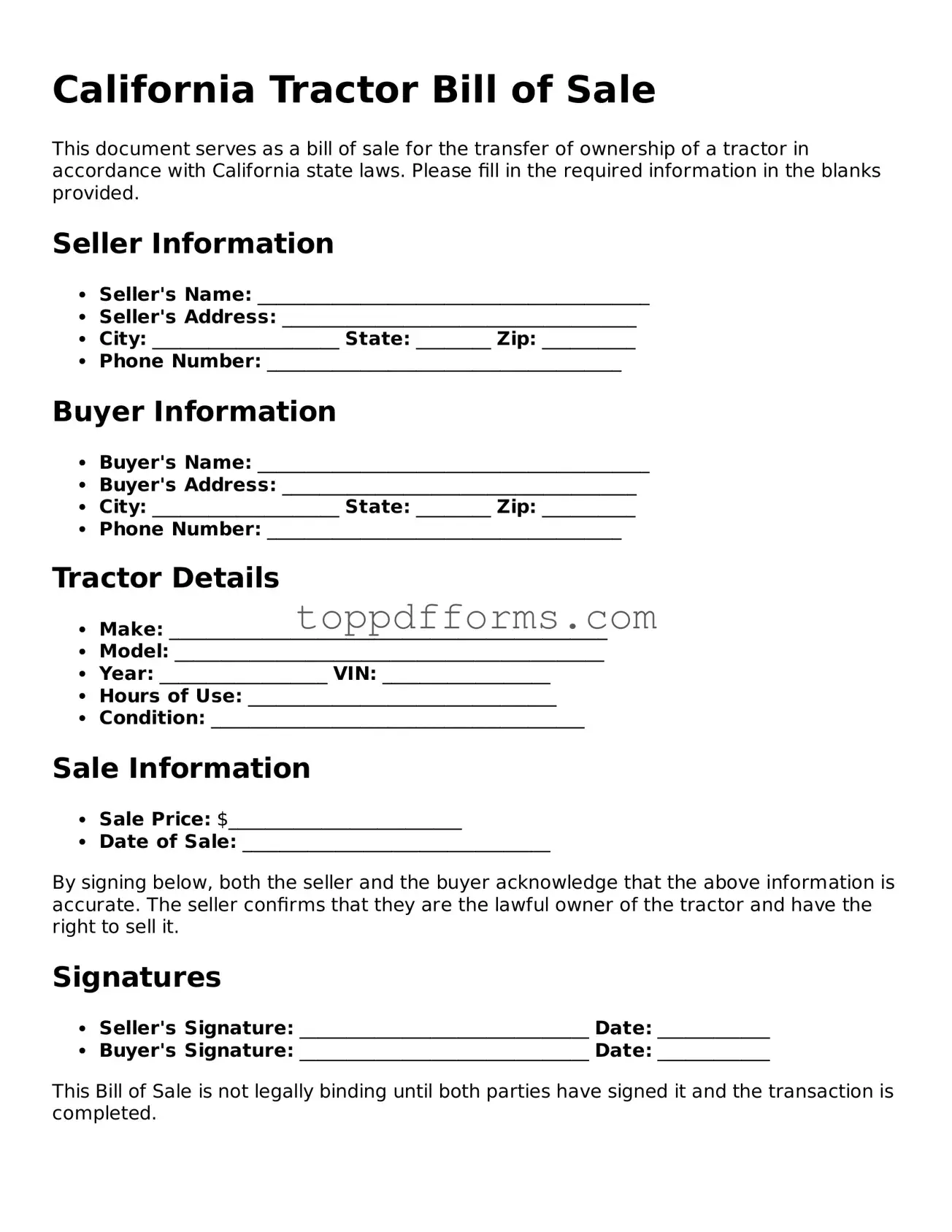Tractor Bill of Sale Document for California State
Things You Should Know About This Form
What is a California Tractor Bill of Sale form?
A California Tractor Bill of Sale form is a legal document that records the sale of a tractor between a buyer and a seller. This form includes essential details such as the names and addresses of both parties, a description of the tractor, the sale price, and the date of the transaction. It serves as proof of the transfer of ownership and can be used for registration purposes with the California Department of Motor Vehicles (DMV).
Is a Tractor Bill of Sale required in California?
While a Tractor Bill of Sale is not legally required in California, it is highly recommended. This document protects both the buyer and seller by providing a clear record of the transaction. In case of disputes or issues regarding ownership, having a Bill of Sale can be invaluable. Furthermore, it may be necessary for the buyer to register the tractor with the DMV.
What information should be included in the form?
The form should include the following information: the names and addresses of both the buyer and seller, the date of the sale, a detailed description of the tractor (including make, model, year, and Vehicle Identification Number), the sale price, and the signatures of both parties. Including additional details, such as any warranties or conditions of the sale, can also be beneficial.
How do I complete a California Tractor Bill of Sale?
To complete the form, both the buyer and seller should fill in their respective information accurately. The seller should provide a thorough description of the tractor, ensuring that all relevant details are included. After filling out the form, both parties should review it for accuracy before signing. It is advisable to keep a copy of the completed Bill of Sale for personal records.
Can I create my own Tractor Bill of Sale?
Yes, you can create your own Tractor Bill of Sale. However, it is crucial to ensure that it includes all necessary information and complies with California laws. Many templates are available online that can guide you in drafting a comprehensive and legally sound document. Alternatively, using a pre-made form can simplify the process and ensure that no important details are overlooked.
What should I do after completing the Bill of Sale?
After completing the Bill of Sale, both the buyer and seller should retain a signed copy for their records. The buyer may need to present this document when registering the tractor with the DMV. If applicable, the seller should also notify the DMV of the sale to avoid any future liability related to the tractor. Keeping all documentation organized can help facilitate a smooth transaction.
PDF Overview
| Fact Name | Description |
|---|---|
| Purpose | The California Tractor Bill of Sale form is used to document the sale and transfer of ownership of a tractor between parties. |
| Governing Law | This form is governed by California Vehicle Code Section 5602, which outlines the requirements for vehicle sales in the state. |
| Required Information | The form requires details such as the buyer's and seller's names, addresses, and the tractor's identification number. |
| Signatures | Both the buyer and seller must sign the form to validate the transaction and acknowledge the transfer of ownership. |
| Notarization | While notarization is not mandatory, it is recommended to enhance the authenticity of the document. |
| Record Keeping | It is advisable for both parties to keep a copy of the completed form for their records and future reference. |
| Use in Registration | The completed Bill of Sale can be presented to the Department of Motor Vehicles (DMV) for registration purposes. |
Common mistakes
When filling out the California Tractor Bill of Sale form, many individuals overlook critical details that can lead to complications down the line. One common mistake is failing to provide complete and accurate information about the tractor. This includes not only the make, model, and year but also the Vehicle Identification Number (VIN). Omitting this information can create confusion regarding ownership and may complicate future transactions.
Another frequent error occurs when sellers neglect to include the sale price. This detail is essential for both parties. Without it, the transaction may be questioned by tax authorities. Buyers and sellers alike should ensure that the sale price is clearly stated to avoid misunderstandings and potential legal issues.
People often forget to sign the document. Both the buyer and the seller must provide their signatures to validate the sale. A missing signature can render the form ineffective, leading to disputes over ownership. It’s important to double-check that all necessary signatures are present before submitting the form.
Lastly, many individuals fail to keep a copy of the completed bill of sale for their records. Retaining a copy is vital for future reference, especially if any issues arise regarding the sale. Having documentation can help clarify disputes and provide proof of ownership. Ensuring that a copy is stored safely can save time and hassle later on.
Other Common State-specific Tractor Bill of Sale Forms
Do You Need a Bill of Sale in Ga - Capture all essential sale information in this concise form.
The Texas Motor Vehicle Power of Attorney form is a vital tool for anyone needing to delegate motor vehicle transactions to another individual. Whether due to time constraints or other commitments, this document ensures that all responsibilities related to vehicle management are handled properly. For those interested in obtaining this form, you can find a convenient option through PDF Templates, making the process straightforward and efficient.
Bill of Sale for Farm Equipment - This document proves the sale of a tractor between two parties.
